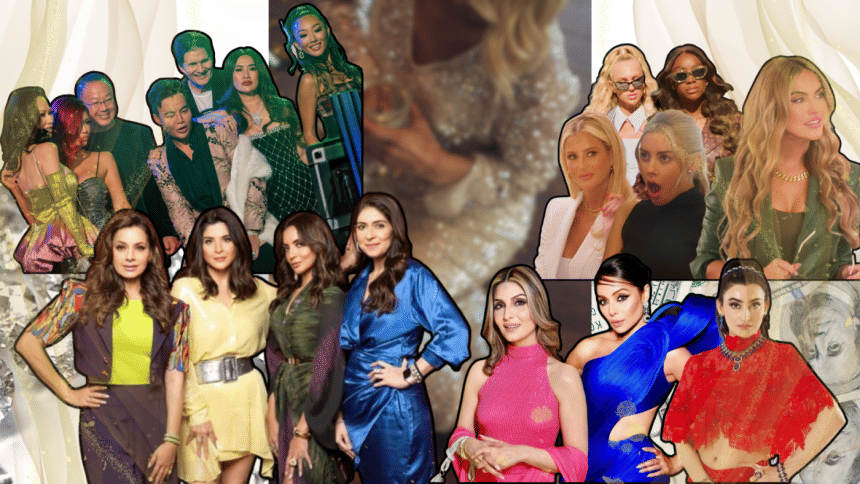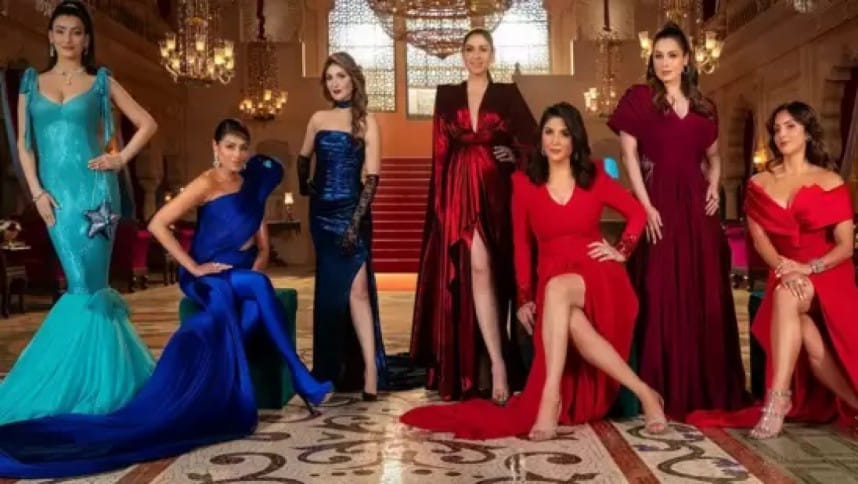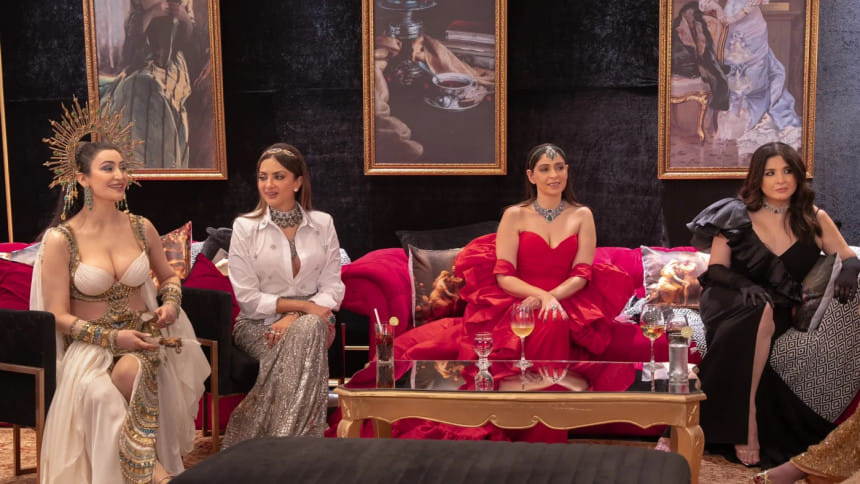The escapist lure of OTT’s bling reality shows

In a world where the news feels like a doomsday clock's countdown and our personal lives consist of work, bills, and endless scrolling of social media platforms, it is no wonder that people flock to OTT-based bling reality shows like moths to a Swarovski-encrusted flame. These glorified exercises in voyeuristic productions like "Fabulous Lives of Bollywood Wives", "Selling Sunset", or even "Bling Empire", serve a very specific purpose: they remind us that no matter how bad things get in our mundane lives, we can always escape into the sparkly yet vapid vacuum of the ultra-rich behaving badly.
"Fabulous Lives of Bollywood Wives", Netflix's currently trending reality juggernaut, has emerged as the reigning queen of this genre, now with an added twist for its third season. As if watching a bunch of well-preserved socialites from Mumbai air-kiss and passive-aggressively compete for social supremacy was not enough, the producers decided to introduce a new element — the age-old Delhi vs Mumbai rivalry is now the focal point of this season because apparently there was not enough "drama" in watching Bhavana Panday, Maheep Kapoor, Seema Kiran Sajdeh and Neelam Kothari Soni bicker over exotic holidays.

Adding a few new faces to this reality circus, the Delhi trio — Shalini Passi, Kalyani Saha Chawla, and Riddhima Kapoor Sahni — was brought to heighten the ante. But instead of the spice and tension the show desperately needed, the Delhi cohort feels more like elaichi in biryani; unnecessary, disruptive, and slightly irritating. Watching these "high-society" women argue about who throws the better ball is like watching a slow-motion catfight at a garden party. Neither city wins, but they sure do waste a lot of champagne trying.
In the new season's first episode, Shalini Passi, a socialite and self-proclaimed art collector, descends a grand staircase at "The Mash Ball" in a gown that looks like it was stitched together from Cleopatra's old bed sheets. Brandishing jewel-encrusted daggers, she twirls them around like she is auditioning for a Hindi remake of "Game of Thrones: Desperate Housewives Edition". Her entrance, much like the rest of the show, screams, "I'm here, I'm fabulous, and I have no idea what I'm doing!" It's the kind of garish spectacle that exemplifies these shows — all glitter, no substance, and the faint smell of Botox. The rest of the season is like watching a competition between overpriced salads, everyone walks away bloated with empty calories. There are, however, fleeting moments of intriguing elements that involve Gauri Khan, Khushi Kapoor, and Saif Ali Khan but other than that it is just our next-door Gulshan aunties fighting their lives to remain relevant.

Let's be real, nobody watches "Fabulous Lives" or similar shows for intellectual stimulation. We do not tune in to learn about art or culture, nor do we expect thought-provoking dialogue. These shows exist to let us, the common folk, gawk at the excessive, over-the-top, and often cringe-worthy antics of the rich and famous. It's the modern version of watching aristocrats parade their wealth while secretly enjoying seeing them trip over their own egos. "Selling Sunset", for instance, follows a similar formula. Replace the sarees and Bollywood ties with Los Angeles' multimillion-dollar real estate market, and you have the same guilty-pleasure-inducing ingredients of superficially attractive women who somehow find time to sell luxury homes between backstabbing each other over who is wearing the most Louboutins. "Bling Empire", on the other hand, is Netflix's attempt at blending the aspirational wealth of "Crazy Rich Asians" with the reality TV chaos of "The Real Housewives". Here, the Asian elites living in Los Angeles flaunt their diamond-encrusted lifestyles while dealing with "relatable problems" like deciding which private jet to take to Paris Fashion Week.
The key to the success of these shows is not their depth, which is about as shallow as the infinity pools they feature. Their hook lies in their ability to offer an escape. These bling shows allow us to forget our problems by indulging in the hollow glitz of other people's excess. It is aspirational content at its finest, or rather, its gaudiest. Watching these socialites sip champagne in gowns worth more than our yearly rent reminds us that while life may be unfair, at least we do not have to endure the emotional trauma of someone making snark comments about our custom-made yacht.

There is something almost cathartic about seeing how utterly ridiculous these ultra-rich people are. Take, Shalini Passi, who proudly declares herself to be the "gossip", as though it is some kind of noble pursuit, or Karan Johar, who swoops in now and then to stir up drama like a theatrics-mongering Gandalf with a penchant for designer handbags. These characters are living their lives in a bubble of privilege so thick, that even the Great Depression could not pop it. Yet, we are hooked because their problems are so trivial that they make our daily grind seem normal.
What makes these shows truly escapist is the fantasy they offer — the fantasy that wealth and status are the ultimate ticket to happiness. But as "Fabulous Lives" and its ilk unintentionally show us, that is not the case. These women, despite their diamonds, designer outfits, and celebrity connections, are as emotionally unfulfilled as the rest of us. Whether it is Neelam's anxiety over her daughter Googling her past realities or Maheep's endless search for validation, these shows subtly remind us that all the bling in the world cannot buy happiness.

I think the true genius of these shows lies in their self-awareness. They know they are absurd, and they play it up. Every awkward ball, every over-the-top vacation, every fight over who has the better diamonds — are meticulously curated to elicit our reaction. We roll our eyes, we laugh, and yet we keep watching. Why? Because deep down, we know that our lives will never resemble the lavish nonsense unfolding on screen, but it is fun to pretend for a little while. It is the same reason we binge-watch shows like "The Real Housewives" or "Keeping Up with the Kardashians". We may not want their lives, but we surely want to watch them implode.
In the end, these OTT shows are not just silly but can prove to be rather therapeutic. We watch these fabulously empty people live their fabulously empty lives, and we feel better about our own modest existence. We can laugh at Shalini's attempt to play Mother India or at Bhavana's inability to plan a party, and then turn off the TV, safe in the knowledge that we do not have to worry about wearing heels at a pool party in Mauritius. They are all bling without the baggage, glitz without the grind — and for me, that is the real appeal. It can just remind me that luxury is fleeting, but "cringe" lasts forever.

 For all latest news, follow The Daily Star's Google News channel.
For all latest news, follow The Daily Star's Google News channel. 





Comments